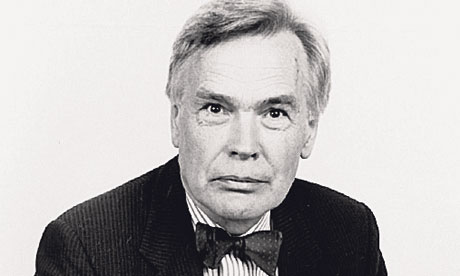
The concept of alcohol dependence is now so entrenched in general awareness and so fundamental to scientific thought that it is difficult to remember a time when the syndrome was unrecognised – and yet the original, provisional description appeared in the British Medical Journal only in 1976. Written by Griffith Edwards, who has died aged 83, and Milton Gross, the now-classic paper signalled Griff's lifetime commitment to studying alcohol and other addictive drugs and his huge contribution to the field.
When he started, the only approach to treating alcoholics was to shut them up for a long time in hospital. Griff, always open to new ideas, challenged this approach by carrying out a study comparing inpatient and outpatient treatment of alcohol dependence. Having demonstrated that outpatient treatment could be effective, he went on to compare the impact of structured, intentional, individual advice with more conventional long-term outpatient treatment. Subsequently he initiated services such as a therapeutic community for heroin addicts, a day centre for drug users, and help for skid‑row drinkers, all novelties in their day, although unsurprising now.
Believing that no single treatment approach was appropriate for every individual, he supported a range of options, including motivational interviewing, cognitive behavioural therapy, relapse prevention, psychotherapy and pharmacotherapy, according to individual need. As a sensitive clinician, he was also aware that the therapeutic relationship between doctor and patient was of fundamental importance.
All his innovations were based on research findings and therefore influenced other clinicians and government policy, transforming the way in which substance abusers are treated. He was particularly concerned that there should be no question of conflict of interest in relation to his research, and never had any involvement with the alcohol industry.
In 1979 he became the first professor of addiction behaviour in the UK, establishing a unit at the Institute of Psychiatry in London, where he gathered around him psychiatrists, psychologists, sociologists, statisticians and even a historian and an anthropologist. Out of this creative mix emerged diverse research covering not just alcohol, but drugs and nicotine, so that the Addiction Research Unit (ARU), then housed in a prefab in Camberwell, south London, rivalled much better funded American centres.
The research was firmly rooted in clinical services, which Griff directed, and he continued to see patients regularly, acknowledging how much he learned from them in his textbook The Treatment of Drinking Problems (1982, and now in its fifth edition). The ARU became the National Addiction Centre, a department of the Institute of Psychiatry, King's College London, which today forms a hub that connects Griff's proteges and students worldwide.
From early in his career Griff advised governments and international bodies. In 1966 he designed the World Health Organisation's alcohol policy, and later did the same for drugs. His many contributions to policy development in the UK included membership of the Advisory Council on the Misuse of Drugs, membership of the council of the Economic and Social Research Council, adviser on alcohol problems to the Department of Health and adviser on alcohol policy to the Cabinet Office.
Griff produced more than 150 scientific papers and 30 books, but was particularly proud of two books written for a general audience – Alcohol: The Ambiguous Molecule (2000; published in the US in 2002 as Alcohol: The World's Favourite Drug") and Matters of Substance (2004). He edited too, starting with the Barts journal while he was a clinical student at St Bartholomew's hospital in London, and taking over the British Journal of Addiction in 1978 from a famous predecessor, Max Glatt. Under his editorship the latter went from four to six issues per year, then becoming a monthly publication; regional offices were established in Australia and America, and in 1993 it was renamed Addiction. Griff was editor-in-chief until 2005, and continued as its commissioning editor until his death.
The younger of two sons, Griff was born in India to a Welsh father and an English mother. Rather than following a strong family tradition of veterinary medicine, he went from Andover grammar school to Balliol College, Oxford, in 1947 on a mathematics scholarship. Switching to medicine, he completed his clinical studies at St Bartholomew's. He knew from the outset that he wanted to be a psychiatrist and trained at the Maudsley hospital, south London, under the influential DL Davies.
He moved to the Institute of Psychiatry as a research worker in 1962 and remained there till formally retiring as professor emeritus in 1994. Thereafter, he retained an office in the National Addiction Centre. He was appointed CBE in 1987 for his services to social science and medicine.
Though his name will always be linked to addiction, his many friends will also remember him for his lively interest in everything, his warmth, his sense of humour and for his hospitality around the kitchen table of the house in Greenwich which he shared with his second wife of 31 years, Sue. She survives him, as do two children of his first marriage, Daniel and Rose; another daughter predeceased him.
• James Griffith Edwards, psychiatrist and addiction specialist, born 3 October 1928; died 13 September 2012

